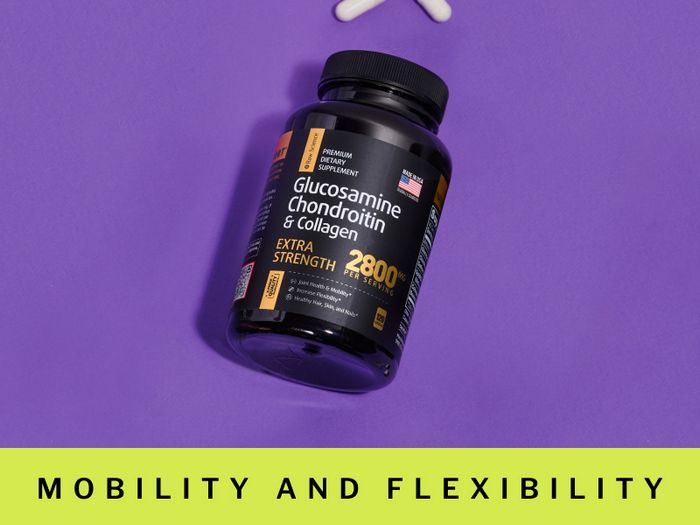Glucosamine supports joint health. Supplements can assist treat osteoarthritis and other inflammatory conditions. It’ s safe for lots of people to consume but may have mild side effects such as queasiness, heartburn, or diarrhea.
When I worked at a supplement store during university, individuals would regularly purchase glucosamine supplements to stop or lessen joint discomfort.
As a result of its popularity, I presumed glucosamine was a safe and efficient supplement for joint health.
Nonetheless, I’ ve considering that learned that the proof to sustain glucosamine for joint wellness and its other supposed health advantages isn’ t as precise as the makers would lead you to believe.
This short article clarifies whatever you require to find out about glucosamine, including its benefits, negative effects, and dosage info.
What is glucosamine?
Glucosamine is a substance that happens normally in your body. Chemically, it’ s classified as an amino sugar.
It acts as a foundation for a variety of functional particles in your body. It’ s mostly acknowledged for its function in developing and preserving the cartilage within your joints.you can find more here glucosamine pills from Our Articles
Glucosamine is also located in some animal and various other nonhuman tissues, including shellfish shells, animal bones, and fungis. Supplemental kinds of glucosamine are usually made from these all-natural resources.
This supplement is frequently utilized to treat and avoid joint problems like osteo arthritis. You might take it by mouth or apply it topically by means of a cream or salve.
Glucosamine is often used as a supplement to deal with signs of numerous inflammatory conditions.
Though glucosamine’ s mechanisms are still poorly comprehended, it shows up to conveniently decrease swelling.
In a tiny research in 18 grownups with overweight, taking 1,500 mg of glucosamine hydrochloride plus 1,200 mg of chondroitin sulfate daily for 28 days lowered C-reactive healthy protein (CRP) —a biomarker of systematic swelling —by 23% compared to sugar pill.
Like a lot of various other study on glucosamine, this research study at the same time supplemented with chondroitin, a substance similar to glucosamine. It’ s additionally associated with your body’ s production and upkeep of healthy cartilage material.
Although glucosamine and chondroitin have actually been revealed to reduced methodical swelling, it’ s unknown whether they have any kind of local anti-inflammatory effects.
That being claimed, glucosamine and chondroitin have actually been shown to inhibit the activation of inflammatory pathways in human synovial cells. These cells are accountable for producing synovial liquid parts, or joint fluid.
Interestingly, glucosamine’ s anti-inflammatory results have actually also has actually been associated with a reduced danger of establishing problems moderated by swelling, like type 2 diabete.
Still, even more research study is required to better understand just how glucosamine may help reduce swelling in your body.
Supports healthy joints
Glucosamine exists normally in your body.
Among its major duties is to sustain the healthy and balanced advancement of articular cartilage, a sort of smooth white tissue that covers the ends of your bones where they meet to create joints.
Together with the lubricating fluid called synovial liquid, articular cartilage material minimizes rubbing and permits bones to relocate freely and painlessly throughout each other.
Extra particularly, it is assumed that glucosamine advertises the development of particular chemical substances, consisting of collagen, that are very important structural elements of articular cartilage and synovial liquid.
Some studies suggest that taking glucosamine supplements may shield joint cells by stopping the malfunction of cartilage, especially in athletes.
As an example, one research study demonstrated that taking 1.5–3 grams of glucosamine daily for 3 months substantially lowered cartilage material failure in college soccer gamers and professional rugby gamers.
These results suggest a joint-protective effect of glucosamine. Nevertheless, even more research study is needed.
Frequently used to deal with bone and joint disorders
Glucosamine supplements are frequently taken to deal with numerous bone and joint conditions. Most scientific study on glucosamine has concentrated on the use of one specific type called glucosamine sulfate.
This molecule has been well-studied for its potential to treat symptoms and illness development connected with osteo arthritis (OA), rheumatoid joint inflammation (RA), and osteoporosis.
Multiple studies indicate that taking day-to-day glucosamine sulfate supplements may offer reliable, long-term treatment for OA by dramatically decreasing pain, helping maintain joint area, and reducing condition development.
Meanwhile, various other researches have not discovered glucosamine to considerably boost joint pain or feature in individuals with hand, hip, or knee osteo arthritis.
Based on the conflicting proof, some scientific organizations suggest against the use of glucosamine for managing knee osteoarthritis.
As such, more human research is required to better recognize the devices of and ideal applications for glucosamine in joint and bone diseases.
Other uses of glucosamine
Individuals frequently make use of glucosamine to deal with a wide variety of persistent inflammatory conditions, although clinical information to sustain this is restricted.
Interstitial cystitis
Glucosamine is commonly advertised as a treatment for interstitial cystitis (IC), a problem defined by chronic swelling of the bladder muscles and symptoms like regular peeing and bladder pain.
IC is connected with a deficiency in a compound called glycosaminoglycan. Due to the fact that your body converts glucosamine into glycosaminoglycan, it’ s hypothesized that taking glucosamine supplements can assist manage IC.
However, trustworthy scientific information to sustain this theory is doing not have.
Inflammatory digestive tract disease
Inflammatory bowel condition (IBD) is a condition that triggers persistent inflammation of the intestinal tracts, typically causing signs and symptoms like bloating, stomach aches, and looseness of the bowels. Like IC, it’ s associated with a deficiency in glycosaminoglycan.
A study in computer mice with IBD suggested that supplementing with glucosamine can decrease swelling.
In one little study, 34 participants with IBD who took N-Acetyl glucosamine —another kind of glucosamine supplements —for 4 weeks reported significant renovations in signs like pain and diarrhea.
Nevertheless, the research study was not blinded and consisted of no control team. This prevents any kind of verdicts from being drawn concerning the effectiveness of glucosamine for enhancing IBD-related signs.
Numerous sclerosis
Several sclerosis (MS) is a chronic condition that impacts your central nerves. Symptoms differ but can include exhaustion, shakes, and problem strolling, speaking, and seeing.
Some individuals claim that glucosamine could be a reliable treatment for MS, yet sustaining study is lacking.
For example, one testimonial revealed no considerable effect of glucosamine supplements on MS relapse rate or illness development.
Glaucoma
Glaucoma is an eye disease that can trigger some vision loss and even loss of sight. Some people believe it can be treated with glucosamine.
Promisingly, research in rats indicates that glucosamine sulfate might promote eye health by minimizing swelling and offering antioxidant results in your retina —the rear of your eye that’ s in charge of receiving light and sending out vision information to your mind.
Nevertheless, one study in humans showed that glucosamine supplements may instead raise glaucoma danger in older grownups —a group that’ s already at increased danger of establishing glaucoma.
Temporomandibular joint problems
Some resources assert that glucosamine is an efficient therapy for temporomandibular joint (TMJ) conditions. These are wellness problems connected to your jaw —like jaw pain and locking of the jaw joint. Nonetheless, research to support this insurance claim remains inadequate.
One small study showed a significant decrease in pain and inflammatory markers as well as boosted jaw movement in participants that got a mixed supplement of glucosamine sulfate and chondroitin.
One more study showed a significant renovation in maximum mouth opening and pain reduction —shown by minimized inflammatory pens —after taking 1.5 grams of glucosamine and 1.2 grams of chondroitin sulfate daily for 8 weeks.
Although these study results are appealing, they don’ t deal sufficient information to support any kind of clear-cut final thoughts. Because of this, a lot more research study is required on the subject.
Does it truly function?
Though wide cases are made about glucosamine’ s positive results on lots of conditions, readily available research only sustains its usage for a narrow variety of them.
Currently, the toughest evidence supports glucosamine sulfate usage for the long-term therapy of OA signs. But also then, evidence stays inconclusive.
Besides this, glucosamine is much less likely to be a reliable treatment for various other diseases or inflammatory problems.
If you’ re still thinking about utilizing glucosamine, think about the top quality of the supplement you pick.
It’ s best to look for third-party certification to guarantee you’ re obtaining precisely what you’ re spending for. Producers happy to have their items tested for pureness tend to have greater standards.
ConsumerLab, NSF International, and US Pharmacopeia (USP) are a couple of independent firms that offer qualification solutions. If you see among their logo designs on your supplement, it’ s more likely to be of top quality.




Comments